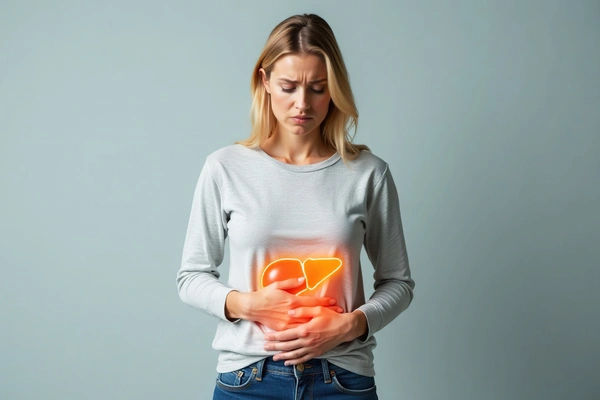Liver Disease Myths Busted: Separating Fact from Fiction
Learn the facts behind common myths about liver disease, its symptoms, diet, supplements, and prevention. Protect your liver with evidence-based care.


Introduction
Your liver is your body's unsung hero, working tirelessly behind the scenes to filter toxins, process nutrients, and regulate metabolism. Yet, it's also an organ shrouded in misconception. Misinformation about liver diseases can lead to unnecessary fear, delayed diagnosis, and poor health choices. From old wives' tales to dangerous internet fads, myths about this vital organ are pervasive. This guide cuts through the noise to bring you evidence-based facts. We will debunk the most common myths about liver health, explore the real causes and symptoms of diseases, and empower you with knowledge for proactive care. Understanding the truth is the first step toward protecting your liver and ensuring your long-term health. Let's unravel the fiction and focus on what truly matters for your well-being.
Understanding Your Liver: The Body's Silent Powerhouse
Before we debunk myths, it's crucial to appreciate the liver's role. This reddish-brown, football-sized organ located in the upper right abdomen is a biochemical factory performing over 500 essential functions.
Vital Functions You Might Not Know About
Beyond filtering blood, the liver produces bile to digest fats, stores vitamins and iron, converts stored sugar into usable energy, and creates proteins essential for blood clotting. It's fundamental to your immune response and hormone regulation. Essentially, if your liver stops working, so does the rest of your body.
Why Liver Health is Crucial for Overall Wellbeing
Because the liver is involved in so many processes, its health directly impacts your energy levels, digestive health, immune system, and even your brain function (a condition called hepatic encephalopathy). Protecting your liver isn't a niche health concern; it's central to your overall vitality.
Consult a Hepatologist for the best advice
Myth 1: Only Alcoholics Get Liver Disease
This is perhaps the most pervasive and dangerous myth. While excessive alcohol consumption is a leading cause of liver damage, it is far from the only one.
The Fact: The Rise of Non-Alcoholic Fatty Liver Disease (NAFLD)
The modern epidemic of liver disease is largely driven by non-alcoholic fatty liver disease (NAFLD), linked to obesity, insulin resistance, type 2 diabetes, and high cholesterol. In India, NAFLD affects nearly 30-40% of the urban population. It occurs when excess fat builds up in the liver cells of people who drink little to no alcohol, proving that liver diseases do not discriminate based on drinking habits.
Other Key Causes: Viruses, Genetics, and Autoimmune Conditions
Hepatitis viruses (B and C) are major causes of chronic liver disease, cirrhosis, and liver cancer worldwide. Autoimmune conditions, where the body's immune system attacks liver cells, genetic disorders like Wilson's disease (copper overload) or hemochromatosis (iron overload), and even certain medications can also cause significant liver damage.
Myth 2: Liver Disease Always Has Obvious Symptoms
Many believe that yellow skin (jaundice) or intense pain are the first signs of a struggling liver. This is a dangerous assumption.
The Fact: The Liver is a "Silent" Organ
The liver has an immense functional reserve and no pain receptors. In the early stages of most liver diseases, there are often no symptoms at all. Damage can progress silently for years, even decades, without causing any noticeable signs. This is why liver conditions are frequently discovered incidentally during blood tests for other reasons.
Early Signs and When to Actually Worry
When symptoms do appear, they are often vague and easily mistaken for other issues: persistent fatigue, weakness, nausea, or loss of appetite. More specific signs like jaundice, dark urine, abdominal swelling (ascites), and easy bruising appear later, indicating more advanced disease. If you experience unexplained fatigue or digestive issues that persist beyond two weeks, consult a doctor online with Apollo24|7 for further evaluation.
Myth 3: Eating Liver Can Cure Your Liver Problems
This myth stems from the "like cures like" philosophy. Unfortunately, nutritional science doesn't support it.
The Fact: Nutritional Science vs. Old Wives' Tales
While liver is a nutrient-dense food rich in Vitamin A, iron, and protein, eating it does not directly repair or "cleanse" your own liver. In fact, if your liver is already damaged, consuming large amounts of animal liver (high in cholesterol and certain vitamins) might do more harm than good. The concept of a single "superfood" curing organ-specific disease is misleading.
What a Truly Liver-Healthy Diet Looks Like
Focus on a balanced, plant-forward diet. The best diet for liver health is rich in fiber (fruits, vegetables, whole grains), includes lean proteins (legumes, fish, chicken), and features healthy fats (nuts, avocados, olive oil). Cruciferous vegetables like broccoli and cauliflower are particularly beneficial as they support the liver's natural detoxification enzymes.
Myth 4: Liver Damage is Always Permanent and Irreversible
This myth fosters a sense of hopelessness, but the reality is far more optimistic, especially with early intervention.
The Fact: The Liver's Remarkable Ability to Regenerate
The liver is the only internal organ that can regenerate itself. If a portion is removed, it can grow back to its original size. This incredible capacity means that liver damage is often reversible if caught in the early, inflammatory stages (like fatty liver or early hepatitis). The organ can heal itself once the offending agent (e.g., alcohol, virus, poor diet) is removed or treated.
The Point of No Return: Understanding Cirrhosis
The exception is cirrhosis, which is late-stage scarring (fibrosis). While the progression to cirrhosis can often be halted, the scar tissue itself is permanent. This is why early diagnosis and lifestyle changes are so critical—to prevent the disease from reaching this irreversible stage.
Myth 5: Herbal and Natural Supplements Are Always Safe for the Liver
The "natural" label is often mistaken for "safe." This is a critical misconception in liver health.
The Fact: The Danger of Unregulated Products
Many herbs and supplements are hepatotoxic, meaning they can cause liver injury. Green tea extract, kava, comfrey, and high doses of vitamin A are known examples. The supplement industry is not tightly regulated, so product purity and concentration can vary wildly, increasing the risk. Are liver supplements safe? Not without medical consultation. Self-prescribing can lead to drug-induced liver injury.
Known Hepatotoxic Substances to Avoid
Always inform your doctor of any supplements you are taking. Avoid unproven "liver cleanse" or "detox" kits, which can be harsh and contain untested ingredients. The safest way to "detox" your liver is to support its natural functions with a healthy diet and plenty of water.
Myth 6: You Only Need a Hepatitis Vaccine if You Travel
This myth underestimates the prevalence of viral hepatitis in our communities.
The Fact: Hepatitis is a Local Threat
Hepatitis B and A are not just travel-related diseases. Hepatitis B is spread through contact with infected blood and body fluids, which can occur through various means, including from an infected mother to her newborn, through unprotected sex, or via contaminated needles (including in healthcare settings). The World Health Organisation estimates that in India, the prevalence of Hepatitis B is between 3-4%. Vaccination is a primary prevention tool for everyone.
Understanding Hepatitis A, B, and C Vaccinations
- Hepatitis A Vaccine: Recommended for all children and for adults with certain risk factors (e.g., chronic liver disease). It protects against a virus spread through contaminated food/water.
- Hepatitis B Vaccine: Part of the universal immunisation program in India. It is recommended for all infants, children, and unvaccinated adults. It is a crucial shield against a virus that can cause chronic infection.
- Hepatitis C: There is no vaccine for Hepatitis C, but it is now curable with oral medications.
Proactive Liver Care: Steps to a Healthier Liver
Prevention is always better than cure. Here’s how you can actively protect your liver.
Dietary Recommendations for Liver Function Support
Emphasise whole foods: colorful fruits and vegetables, whole grains, and lean proteins. Coffee, in moderation, has been shown in studies to have protective effects against liver fibrosis. Stay hydrated with water and limit processed foods, sugary drinks, and excessive saturated fats.
Lifestyle Modifications to Reduce Risk
Maintain a healthy weight through diet and regular exercise, as obesity is a primary driver of NAFLD. Drink alcohol in moderation, or not at all. Practice safe sex and avoid sharing personal items like razors or toothbrushes to prevent viral hepatitis transmission.
The Role of Regular Health Check-ups
This is the most critical step. Regular health check-ups that include a liver function test (LFT) can detect problems early, often before symptoms arise. Apollo24|7 offers convenient home collection for tests like LFT, providing a hassle-free way to monitor your liver health.
Conclusion
Navigating the world of health information is challenging, and liver diseases are particularly plagued by myths and half-truths. We've dismantled some of the most common ones, from the outdated link between liver disease and alcohol alone to the dangerous belief that all-natural supplements are harmless. The core truth is that your liver is a resilient but vulnerable organ whose health is deeply intertwined with your overall lifestyle choices. Empowerment comes from knowledge and action. By understanding the real risks, recognising the value of silent screening, and adopting liver-friendly habits, you take control of your health narrative. Don't let misinformation dictate your well-being. Schedule a conversation with your doctor or a simple check-up today—it's the most powerful step you can take to ensure your body's silent powerhouse continues to support you for years to come.
Consult a Hepatologist for the best advice
Consult a Hepatologist for the best advice

Dr. E Prabhakar Sastry
General Physician/ Internal Medicine Specialist
40 Years • MD(Internal Medicine)
Manikonda Jagir
Apollo Clinic, Manikonda, Manikonda Jagir
(150+ Patients)

Dr. Aswin S. Krishna
Hepatologist
10 Years • MBBS, MD (Internal Medicine,MMC), DM (Hepatology, MMC), PDF(Fellowship in Liver Transplanatation)
Chennai
Apollo Hospitals Greams Road, Chennai
(125+ Patients)

Dr. Aakash Garg
Gastroenterology/gi Medicine Specialist
12 Years • MBBS, DNB (Medicine), DrNB (Gastroentrology).
Bilaspur
Apollo Hospitals Seepat Road, Bilaspur
(150+ Patients)

Dr. Murugan N
Hepatologist
18 Years • MBBS, MRCPI, FRCPG
Chennai
Apollo Hospitals Greams Road, Chennai
(425+ Patients)

Dr U V U Vamsidhar Reddy
Hepatologist
10 Years • MBBS, MD (JIPMER), DM (Hepatology, PGIMER)
Chennai
Apollo Hospitals Greams Road, Chennai
(75+ Patients)
Consult a Hepatologist for the best advice

Dr. E Prabhakar Sastry
General Physician/ Internal Medicine Specialist
40 Years • MD(Internal Medicine)
Manikonda Jagir
Apollo Clinic, Manikonda, Manikonda Jagir
(150+ Patients)

Dr. Aswin S. Krishna
Hepatologist
10 Years • MBBS, MD (Internal Medicine,MMC), DM (Hepatology, MMC), PDF(Fellowship in Liver Transplanatation)
Chennai
Apollo Hospitals Greams Road, Chennai
(125+ Patients)

Dr. Aakash Garg
Gastroenterology/gi Medicine Specialist
12 Years • MBBS, DNB (Medicine), DrNB (Gastroentrology).
Bilaspur
Apollo Hospitals Seepat Road, Bilaspur
(150+ Patients)

Dr. Murugan N
Hepatologist
18 Years • MBBS, MRCPI, FRCPG
Chennai
Apollo Hospitals Greams Road, Chennai
(425+ Patients)

Dr U V U Vamsidhar Reddy
Hepatologist
10 Years • MBBS, MD (JIPMER), DM (Hepatology, PGIMER)
Chennai
Apollo Hospitals Greams Road, Chennai
(75+ Patients)
More articles from Liver disease
Frequently Asked Questions
What are the first signs of a fatty liver?
The first signs of a fatty liver are often absent. When present, they are very non-specific and include persistent fatigue, weakness, and mild discomfort or fullness in the upper right abdomen. It is typically detected through blood tests showing elevated liver enzymes or an ultrasound scan.
Can you fully recover from liver damage?
Yes, in many cases you can. The liver has a fantastic ability to heal itself if the damage is caught in the early, inflammatory stages (like simple fatty liver or hepatitis). Once the cause is removed—such as stopping alcohol, losing weight, or treating a virus—the liver can often repair itself completely. However, advanced scarring (cirrhosis) is permanent.
How often should I get my liver checked?
For healthy adults with no known risk factors, a liver function test as part of an annual health check-up is sufficient. If you have risk factors like obesity, diabetes, a family history of liver disease, or consume alcohol regularly, your doctor may recommend more frequent monitoring, perhaps every 6 months.
Are liver cleansing diets or juices effective?
No, popular liver cleansing diets are not scientifically proven to be effective. Your liver is a natural detoxifier; it doesn't need extreme juices or diets to 'cleanse' it. These can sometimes be harmful. The best way to support your liver is through a consistent, balanced diet rich in fruits, vegetables, and whole grains, and by staying hydrated.
Is liver cirrhosis a death sentence?
No, a diagnosis of cirrhosis is not an immediate death sentence. While it is a serious and irreversible condition, its progression can often be slowed or halted with proper treatment and lifestyle changes. Management focuses on treating the underlying cause, preventing complications, and improving quality of life. In advanced cases, a liver transplant can be a curative option.

.webp)


